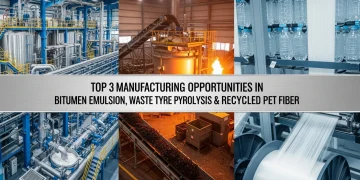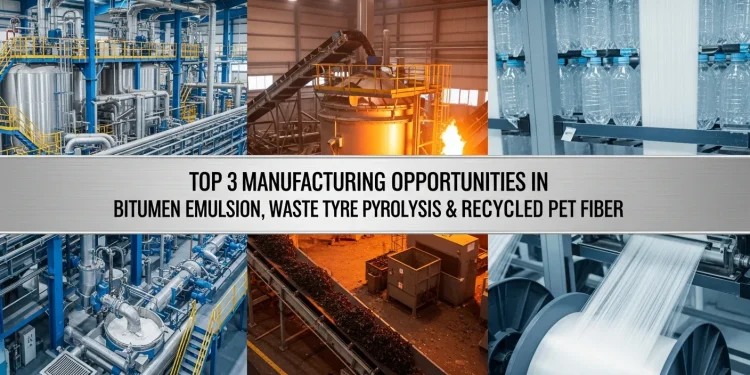Manufacturing Opportunities: Currently, many business owners are interested in starting ventures that are both environmentally friendly and profitable. For this reason, three manufacturing ideas are becoming increasingly popular: bitumen emulsion, waste tyre pyrolysis, and recycled PET fiber. These ideas are aimed at lowering plastic waste, recycling plastic, and improving road quality. Each opportunity will be briefly explained below.
Bitumen Emulsion (A Road Construction Material That is Easy and Safe to Use)
Bitumen emulsion is composed of asphalt, water, and the chemicals called emulsifiers. In contrast to hot asphalts, emulsion can be used without high temperatures, meaning the emulsion can be used without high heating requirements and is safer and easier to work with.
Read More: Production of Bitumen Emulsion Manufacturing Plant
Reasons Why Bitumen Emulsion is Used
The bitumen emulsion can be used in its cold form, meaning it is safe.
It can be used in a variety of road construction tasks including road surfacing, repairing potholes, and sealing of road cracks(Manufacturing Opportunities).
It is a safer alternative as it decreases fuel consumption and increased smoke emissions. The emulsion also improves water resistance, thereby increasing the durability of the road(Manufacturing Opportunities).
Forecasting the future of pulmonary emulsion is in high demand as many nations are adding new road construction. Approximately 5-6% every year, and governments are in support of construction materials that are environmentally friendly.
Getting Small Plant Started(Manufacturing Opportunities):
- A colloid mill is used to mix water, emulsifiers, and bitumen.
- Install the necessary fuel tanks, pumps, and heating systems.
- Conduct simple laboratory tests to maintain quality.
- Sell to road contractors and government road authorities.
Read More: Maximizing Profits with a Sustainable Waste Tyre Pyrolysis Plant: A Comprehensive Guide
Waste Tyre Pyrolysis (Turning Old Tyres into Oil)
Waste tyre pyrolysis involves heating old, waste tyre rubber without oxygen and breaking it down into useful products. Pyrolysis is a business opportunity because waste tyres are currently a significant problem.

What You Get from Pyrolysis
- Pyrolysis-produced oil is used as an industrial fuel.
- Carbon black is used as a filler for rubber items.
- The steel wire is sold as scrap metal.
- The process produces gas which is used as fuel to heat the plant to conserve fuel.
Read Our Project Report: Click Here
Why the Demand is Growing
- Waste tyre disposal regulations are becoming stricter.
- Inexpensive fuel options are highly sought after by many industries.
- The market for carbon black and steel is steady.
- The process of pyrolysis reduces pollution and the waste in landfills.
Market Outlook
The pyrolysis of tyre rubber is an enlarging scope of industry. Experts anticipate the growth of at least 6–10% every year and with this the industry is likely to reach multi-billion dollar status by the early 2030s.
Starting Point
- You need to secure a steady supply of waste tyres.
- You need to choose a batch or continuous pyrolysis plant.
- You need to install adequate pollution control equipment.
- You need to safely store and sell oil to users that require industrial fuel.
- You need to market carbon black and steel to buyers located locally.
Read More: Production of Recycled Polyester Fiber from used PET Bottles
Recycled PET Fiber (Turning Bottles into Fiber Products)-Manufacturing Opportunities
Recycled PET fiber entails conversion of plastic bottles into fiber. First the used bottles are collected, sorted, cleaned, and then shredded. The shreds are melted down and extruded into polyester fiber. The fiber is then used to manufacture clothes, filling, and upholstery, as well as various types of non-woven textiles.
Reasons Why Recycled PET Fiber is Popular
First and foremost of the several reasons is the growing consumer demand for eco-friendly products. Secondly, of the benefits of using polyester as a raw material for manufacturing textiles, the most relevant is the decrease in energy consumption and carbon footprint as a result of using recycled polyester.
Thirdly, used plastic bottles are a plastic waste stream that is easily and abundantly accessible all over the world. Fourthly and lastly, the rPET has nearly equaled that of virgin polyester.
Market Analysis-Manufacturing Opportunities
The rPET fiber market is already substantial in size, approximately USD 15- 20 billion. It is growing at a rate of 8-9% per annum and is projected to nearly double by 2035(Manufacturing Opportunities).
How to Start the Business:
A) Collect or purchase used PET bottles.
B) Sort, wash, and shred them.
C) Melt and spin the fiber to make yarn.
D) Sell to textile mills or nonwoven fabric manufacturers.
E) Maintain quality and consistency to get better prices and sustain long-term buyer relationships.
Find the Best Idea for Yourself With our Startup Selector Tool
How NPCS Can Help You
NPCS assists budding business owners in figuring out how to easily and effectively get into the manufacturing sector. NPCS project reports detail every aspect of a manufacturing business and also cover the (step-wise) process, raw materials needed, machines required, the layout of the plant, how much money is needed to set it up, and the profits that can be made.
They also display the market demand and the risks that can be involved, enabling you to make prudent and less risky decisions once you invest money. NPCS gives a roadmap to entrepreneurs to commercialize their ideas.
Read Our Book: Click Here
FAQS-Manufacturing Opportunities
1.What is the reason behind the increased popularity of bitumen emulsion?
A.It is safe and simple to use; it is also environmentally friendly for use in road construction.
2.Is tyre pyrolysis a profitable business?
A.It is profitable because you get fuel, carbon black and steel from cheap waste tyres.
3.What is the reason behind the increased demand for recycled PET fiber?
A.Because many brands opt for sustainable materials in textiles and many consumers of these products prefer eco-friendly products.
4.What is the biggest expense in the process of producing recycled PET fiber?
A.It is the collection, washing, and processing of PET bottles.
5.Is it possible for NPCS to help me in these industries?
A.NPCS provides detailed professional project reports and assistance for every one of these setups.


















